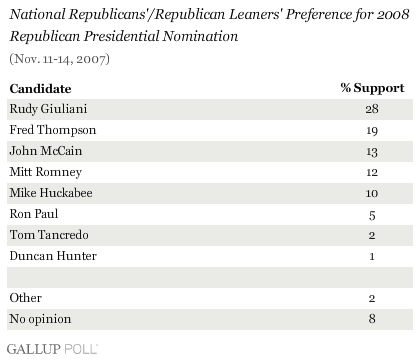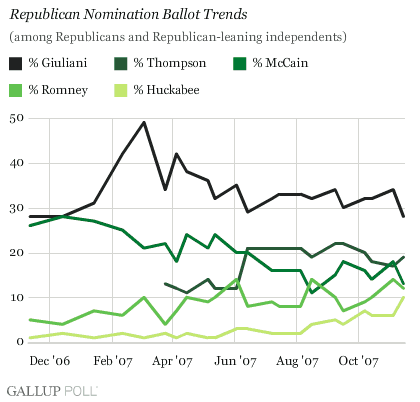PRINCETON, NJ -- The latest Gallup Poll update on national Republicans’ preferences for the party’s 2008 nomination shows former New York City Mayor Rudy Giuliani continuing to lead the field, although his support has dropped below 30% for the first time since June, and his nine-point lead is on the low end of what he has held since February. Four other GOP candidates now register double-digit support, including former Arkansas Gov. Mike Huckabee, who now has his highest level of support to date. In general, the Republican field appears more tightly bunched than at other times this year, suggesting the possibility of a highly competitive race for the party’s presidential nomination.
The Nov. 11-14 Gallup Poll finds 28% of Republicans and Republican-leaning independents nationwide naming Giuliani as their first choice for the party’s 2008 presidential nomination. Former Tennessee Sen. Fred Thompson is second, at 19%. Thompson appears, for the moment, to have halted some negative momentum, as his numbers had fallen slightly in each of the three prior polls. Thompson received a key endorsement from the National Right to Life Committee this week, although it is unclear whether that would have boosted his support.
Arizona Sen. John McCain (13%), former Massachusetts Gov. Mitt Romney (12%), and Huckabee (10%) are closely matched for third place. Texas Rep. Ron Paul places sixth with 5% support.

This marks the first time Huckabee’s support has reached double digits in a Gallup Poll. He currently places second in several polls of Republicans in the state of Iowa, site of the first Republican caucus. The leader in those Iowa polls is Romney, who for the first time has seen his national support in double digits for three successive polls.
Since February, Giuliani has led every Gallup Poll by a statistically significant margin. His largest lead during this time was 28 points in early March (before Thompson’s support was measured) and his smallest lead of 8 points occurred on three separate occasions in May, June, and September.

Last week, noted televangelist Pat Robertson endorsed Giuliani for president. The poll sought to gauge the possible impact of that endorsement by asking Republicans whether Robertson’s endorsement would make them more likely to vote for Giuliani, less likely to do so, or would not affect their vote. Typically, poll respondents say endorsements do not sway their vote, and that is the case here -- 76% say their vote will be unaffected. Nearly as many Republicans say Robertson’s endorsement makes them less likely to vote for Giuliani (9%) as say it makes them more likely (12%) to do so.
Among the roughly 6 in 10 Republicans in the current poll who say they are extremely likely to vote in their state’s 2008 presidential primary or caucus, Giuliani (25%) and Thompson (21%) are essentially tied. McCain (13%), Romney (12%), and Huckabee (12%) tie for third among this group.
In the prior poll, 31% of “likely” Republican primary or caucus voters favored Giuliani, with Thompson and McCain both at 20%. Given the small sample sizes of likely primary voters from a single poll, these changes are not statistically significant.
With the Iowa caucuses less than two months away, the campaign is beginning to heat up. As Republicans begin to focus more attention on the candidates, their preferences could begin to show change. Already it appears that Romney and Huckabee have improved their national standing in recent months. Giuliani has led for much of the year, and while his support is down in the current poll, it is unclear at this point whether that is the beginning of a trend toward a tighter race or a temporary variation in support.
Survey Methods
These results are based on telephone interviews with a randomly selected national sample of 398 Republicans and Republican-leaning independents, aged 18 and older, conducted Nov. 11-14, 2007. For results based on this sample, one can say with 95% confidence that the maximum error attributable to sampling and other random effects is ±5 percentage points. In addition to sampling error, question wording and practical difficulties in conducting surveys can introduce error or bias into the findings of public opinion polls.
